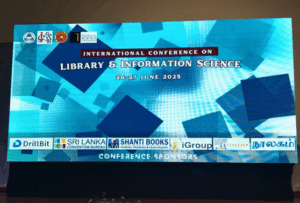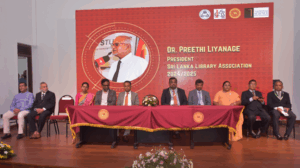Learning Beyond Borders: Reflections from Nepal’s Participation in ICLIS25 in Sri Lanka
15 September 2025
Nepal’s participation in the International Conference on Library and Information Science (ICLIS25), jointly organized by the Sri Lanka Library Association (SLLA) and the University of Peradeniya, was not only a matter of regional collaboration—it was a significant learning opportunity for Nepal’s library professionals, policymakers, and academic institutions.

Held in the serene and intellectually vibrant campus of Peradeniya University in Kandy, Sri Lanka, the conference brought together delegates from across South Asia and beyond. Nepal was represented by a team of library leaders and scholars who actively contributed to discussions, presentations, and policy dialogues—especially highlighting Nepal’s efforts toward digital transformation and regional partnerships in knowledge development.
A Model of Integrated Libraries
One of the most striking insights gained from ICLIS25 was observing the comprehensive integration of academic, public, and special libraries in Sri Lanka. Unlike the often fragmented and under-resourced library landscape in Nepal, Sri Lanka’s libraries operate under clear institutional mandates, enjoy stable financial support, and follow nationally aligned library policies.
For example:
- D.S. Senanayake Memorial Public Library in Kandy serves as a major public knowledge hub with a strong digital and physical presence.
- Nurwar Eliya Public Library which also serves as the Tourist Information Centre
- Colombo Public Library, one of the oldest and largest in South Asia, offers a range of services from children’s sections to digital archives, and conducts outreach programs including mobile libraries, book box projects for underprivileged children, and community engagement activities.
- The University of Peradeniya, Main Library showcases how academic libraries can support cutting-edge research while preserving national literature and scholarly output.
- The National Museum Library serves as a vital institution for historical documentation and public learning.
These institutions reflect Sri Lanka’s commitment to equitable access, preservation of cultural heritage, and lifelong learning.
Knowledge Centers Beyond Books
Sri Lanka has developed a robust ecosystem of knowledge centers that go beyond simply storing books. They are vibrant spaces where research, culture, and innovation intersect. The Nepalese delegation was particularly impressed by the country’s use of digitization and cataloging technologies, allowing broader public access to materials.
Special libraries in Sri Lanka are also thriving. For example:
- Law libraries, government archives, medical libraries, news agency libraries, and corporate knowledge centers are well-maintained and serve specific professional communities with precision and care.
- The National Museum and the Sri Dalada Maligawa (Temple of the Sacred Tooth Relic) in Kandy serve not only as cultural heritage sites but also as custodians of historical documents and manuscripts—showcasing how libraries and museums can work hand-in-hand in heritage preservation.
A Literacy-Driven Society: Social Investment through Libraries
One of the most inspirational takeaways from the Sri Lankan model is how public libraries are funded through local and provincial governments as part of their social responsibility, often referred to as “a promised and proud fund for the people.” This approach symbolizes a deep-rooted belief in libraries as enablers of social justice, equity, and civic empowerment.
In Sri Lanka, the adult literacy rate is projected to reach 92% in 2025 (World Bank). This figure reflects the proportion of the population aged 15 and above who can read and write a short, simple statement about their everyday life. Such a high literacy rate is not coincidental, it is the outcome of systemic educational policies, accessible library services, and a culture of reading.
As a UNESCO report—Education for All Global Monitoring Report 2006: Literacy for Life—states:
“All over the world, libraries are dedicated to providing free and equitable access to information for all… They play a key role in creating literate environments and promoting literacy by offering relevant and attractive reading material for all ages and all literacy levels, and by offering adult and family literacy classes.”
Libraries embrace a social responsibility to bridge social, political, and economic barriers and extend their services to marginalized populations. They empower citizens by facilitating lifelong learning, informed citizenship, critical thinking, creative imagination, and access to opportunities in an increasingly complex world.
The difference in global priorities is also evident in the often-quoted observation:“Developed countries invest in libraries, while autocratic countries build more prisons.”
This reflects a profound distinction in values—between education and oppression, between opportunity and control. Developed nations view libraries as infrastructures of hope and opportunity.
Real development is visible in daily behaviors and attitudes shaped by learning environments:
- Respect for pedestrian rights at zebra crossings
- Maintenance of personal and community hygiene
- Green country initiatives and environmental consciousness
- Good study habits and academic discipline
- Civic-mindedness and community participation
These behaviors are not coincidental but cultivated in societies where libraries, schools, and communities work in harmony to shape informed, responsible citizens.
Financial and Policy Strengths
Sri Lanka also sets an example in terms of financial models for library sustainability. Through government funding, donor support, and institutional partnerships, libraries in Sri Lanka are equipped with the tools and human resources needed for modern library service delivery. Their practice of certifying librarians, encouraging continuous professional development, and embedding library science in national education policies is a benchmark for Nepal.
This structure provides a useful model as Nepal works to develop the Nepal National Digital Library and standardize library services nationwide. Learning from Sri Lanka, we can aim for policy coherence, professional recognition, and technology integration in our own knowledge institutions.
Toward Regional Solidarity: Regional Federation of South Asian Library Associations ICLIS25 also provided a platform for launching broader regional initiatives. Nepal’s presentation on forming the Regional Federation of South Asian Library Associations (REFSALA) was warmly received. This emerging federation promises to foster cross-border collaboration, shared learning, and joint advocacy for the library and information science profession across South Asia.
Conclusion
ICLIS25 reaffirmed that libraries are not just passive storage spaces, but dynamic institutions central to national development, civic life, and cultural identity. As Nepal transitions into a digital and knowledge-driven era, we must adopt best practices and regional models like those in Sri Lanka to strengthen our own library ecosystem.
Our experience at ICLIS25 inspires us to work toward:
- Strengthening our public and academic libraries
- Establishing digitally connected knowledge centers
- Promoting professional standards and sustainable funding
- Ensuring equitable access to information for all citizens
Let us remember: Access to knowledge is a right, not a privilege.
The road to a knowledge-based society begins with a vision, collaboration, and a commitment to excellence in library development.

Published in recognition of Nepal’s active engagement at ICLIS25 and the enduring partnership between the Nepal Library Association and regional counterparts across South Asia.
By Pushparaj Subedi, President, Nepal Library Association